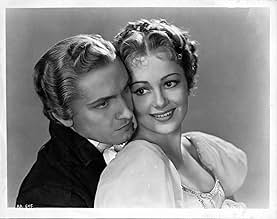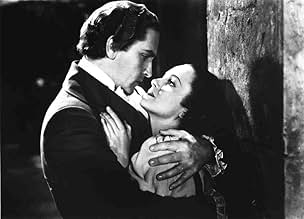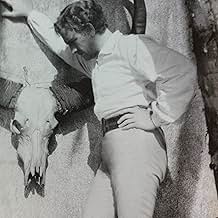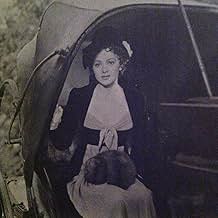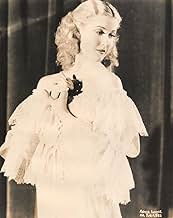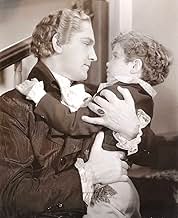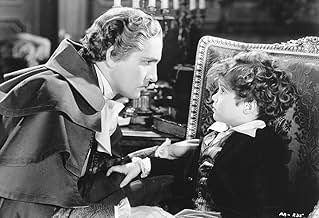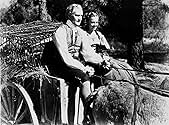Anthony Adverse
- 1936
- Tous publics
- 2h 21m
IMDb RATING
6.3/10
2.1K
YOUR RATING
In 18th-century Italy, an orphan's debt to the man who raised him threatens to separate him forever from the woman he loves.In 18th-century Italy, an orphan's debt to the man who raised him threatens to separate him forever from the woman he loves.In 18th-century Italy, an orphan's debt to the man who raised him threatens to separate him forever from the woman he loves.
- Won 4 Oscars
- 8 wins & 3 nominations total
Featured reviews
Fredric March, usually such a fine actor, was unable to give more than a wooden performance in the title role of 'Anthony Adverse'. Warner Bros. would have been better off using their up-and-coming new star, Errol Flynn, for this one--giving us the chance to see him paired once again with Olivia de Havilland. There are no sparks between March and de Havilland--he seems too old for the role despite clever make-up attempts to make him look suitable. But aside from the fact that he is miscast, there is a lot to admire about the film itself. For one thing, Claude Rains and Gale Sondergaard make the most memorable pair of villains ever seen in a 1930s movie. The sequence where they cause a coach and driver to go off a cliff is given an extra punch by their dialog. "He was my favorite coachman," says Rains dryly. "The coach was rather handy too," quips Sondergaard. Giving other outstanding performances are Edmund Gwenn, Louis Hayward, Anita Louise, Donald Woods and Akim Tamiroff. Some of the acting styles seem dated, as are the titles that connect the time span. The best-seller was a bulky 1,200 pages from which the scriptwriter trimmed the story down considerably, excluding whole segments of the book and still ending up with a film well over two hours. Strange how the celebrated novel is barely remembered today. The opera scenes with Olivia de Havilland are interesting. She was a radiant young beauty at the time but could have used a better technique in her lip sync to the lyrics. Interesting historical drama of the Napoleonic era with Rains and Sondergaard giving the best performances. I've written articles on both of them for CLASSIC IMAGES, inspired by their performances in this film.
Fredric March stars as the title character, an orphan boy discarded due to his illegitimacy, who overcomes much adversity throughout his life. He is raised in a convent and adopted by a wealthy merchant, Edmund Gwenn, at the age of ten. He learns the business, but is shipped to Havana around the time of the French Revolution. Before he departs, it is learned that he has married the daughter of a servant, Olivia DeHavilland. He is thought lost at sea by all, but is actually in Africa running a slave trade, with his heart blackening the whole time. From there, the tale takes many twists as Anthony must find goodness in his heart again, and DeHavilland may be the key. The drama is a bit heavy-handed and some overacting is present. Claude Rains and Gale Sondergaard make great antagonists, and Sondergaard won a Best Supporting Actress Oscar for her performance.
I rented a tape of Anthony Adverse mainly to see what kind of performance the Academy was looking for in the first-awarded "best supporting actress" category. Gale Sondergaard's time on camera was actually quite brief and her villainous role required a strictly one-dimensional reading. There were no subtleties whatsoever, nor was there any need in the film for them. Ordinarily, it might seem surprising that her part would receive any attention at all, not to mention a prestigious award, but keeping in mind that Oscars in those days were to a large extent self-congratulatory spectacles passed around from studio to studio year by year, it really isn't surprising.
The film was long and episodic, as was the novel, and not particularly good at that. There was the glitz we've come to expect of course with the duels and chases thrown in for good measure. I kept wondering if the novel was written with Hollywood in mind. It's hardly readable nowadays. As far as directorial touches are concerned, it's no wonder that Mervyn LeRoy has long disappeared from anyone's pantheon. The kiddie-car version of France must have excited the Depression audiences. The film is very long and very expensive so perhaps there's something to say about that.
The film was long and episodic, as was the novel, and not particularly good at that. There was the glitz we've come to expect of course with the duels and chases thrown in for good measure. I kept wondering if the novel was written with Hollywood in mind. It's hardly readable nowadays. As far as directorial touches are concerned, it's no wonder that Mervyn LeRoy has long disappeared from anyone's pantheon. The kiddie-car version of France must have excited the Depression audiences. The film is very long and very expensive so perhaps there's something to say about that.
I have not read the largely forgotten book on which this movie is based.
My favorite films are from the early 30's to the mid 40's. The cast in this film is stellar, including some of my favorite leads and supporting actors. I love costume dramas and adventures set in exotic places. However, with all of those factors to prejudice me in favor of Anthony Adverse, I was hugely disappointed.
The plot seems okay. The sets and costumes are excellent. The cast, as I already mentioned, is stellar (in the credits!). The score seems appropriate. The expensive production shows throughout. The reason this film is so unsatisfying is rather puzzling. I think it may be one of those times everybody from the director on down was simply going through the motions. Hard to believe, given the cast. But they all seem so - not just two-dimensional, but - lifeless. Perhaps, as one other reviewer suggests, this film would have been better if de Havilland had been teamed with Errol Flynn instead of Frederic March. I don't remember seeing Flynn ever give a less than energetic performance.
Frederic March, one of America's greats, fails to create a character that I could like, sympathize with or root for with any enthusiasm. In fact enthusiasm is what he seems to lack in this role. Olivia de Havilland is somewhat better, but this is one of her least impressive performances. Gale Sondergaard did very little to receive an academy award. The appearances of Louis Heyward and Anita Louise are entirely too short. I like both, and I would have liked more of them and less of March and de Havilland. Perhaps they should have reversed roles...
Edmund Gwenn delivers a typically endearing performance in a typical Edmund Gwenn role. Henry O'Neill is usually very interesting, because he plays both sides of the fence - both good and bad guys. Here, his father Xavier is far more enjoyable than Pedro De Cordoba's Father Francoise.
The only bright spot in this under-achieving ensemble is Claude Rains. He, too, plays both good and bad guys. Here he is an aristocratic charmer and schemer - despicable and deceitful. He is great! In the scene where he laughs demonically, he sends a chill up my spine. Thank you, Mr. Rains, for delivering a great, under-appreciated performance, in an otherwise deservedly forgotten film.
At film's end, I felt like I had read a 1200 page novel - and simultaneously like I had no interest in reading THIS one.
My favorite films are from the early 30's to the mid 40's. The cast in this film is stellar, including some of my favorite leads and supporting actors. I love costume dramas and adventures set in exotic places. However, with all of those factors to prejudice me in favor of Anthony Adverse, I was hugely disappointed.
The plot seems okay. The sets and costumes are excellent. The cast, as I already mentioned, is stellar (in the credits!). The score seems appropriate. The expensive production shows throughout. The reason this film is so unsatisfying is rather puzzling. I think it may be one of those times everybody from the director on down was simply going through the motions. Hard to believe, given the cast. But they all seem so - not just two-dimensional, but - lifeless. Perhaps, as one other reviewer suggests, this film would have been better if de Havilland had been teamed with Errol Flynn instead of Frederic March. I don't remember seeing Flynn ever give a less than energetic performance.
Frederic March, one of America's greats, fails to create a character that I could like, sympathize with or root for with any enthusiasm. In fact enthusiasm is what he seems to lack in this role. Olivia de Havilland is somewhat better, but this is one of her least impressive performances. Gale Sondergaard did very little to receive an academy award. The appearances of Louis Heyward and Anita Louise are entirely too short. I like both, and I would have liked more of them and less of March and de Havilland. Perhaps they should have reversed roles...
Edmund Gwenn delivers a typically endearing performance in a typical Edmund Gwenn role. Henry O'Neill is usually very interesting, because he plays both sides of the fence - both good and bad guys. Here, his father Xavier is far more enjoyable than Pedro De Cordoba's Father Francoise.
The only bright spot in this under-achieving ensemble is Claude Rains. He, too, plays both good and bad guys. Here he is an aristocratic charmer and schemer - despicable and deceitful. He is great! In the scene where he laughs demonically, he sends a chill up my spine. Thank you, Mr. Rains, for delivering a great, under-appreciated performance, in an otherwise deservedly forgotten film.
At film's end, I felt like I had read a 1200 page novel - and simultaneously like I had no interest in reading THIS one.
Hervey Allen (1889-1949) spun quite an elaborate, sweeping 18th-19th century yarn in the form of a gigantic novel, published in 1933, called "Anthony Adverse." It became a best-seller, and three years later Warner Bros. brought it to the screen, directed by Mervyn LeRoy.
The film was very long, comprehensive, and romanitc, in Allen's quasi-Dumas-Dickens-Tolstoy style.
Heading the cast were four of the screen's finest actors, leading players Fredric March and Olivia de Havilland; and supporting character players Claude Rains and Gale Sondergaard.
Providing the musical score was the legendary Eric Wolfgang Korngold (with orchestrations by Hugo Friedhofer) and classic masque and operatic excerpts by Monteverdi and Francetti.
The 141-minute film today seems much longer than it is, as we follow Anthony's detailed "adventures" in Europe, Cuba, and Africa, with America targeted as a final future destination. The whole production, which was considered of blockbuster size in 1933 (and still looks impressive), emerges more like a historic relic that is occasionally pulled from a treasure cabinet, to observe and ponder.
The whole feel of the film now seems dated and out-of-fashion, but then that's what most memorabilia is. It's merely dusted it off, polished, felt for the moment, then replaced along side other treasured pieces from the past.
The film was very long, comprehensive, and romanitc, in Allen's quasi-Dumas-Dickens-Tolstoy style.
Heading the cast were four of the screen's finest actors, leading players Fredric March and Olivia de Havilland; and supporting character players Claude Rains and Gale Sondergaard.
Providing the musical score was the legendary Eric Wolfgang Korngold (with orchestrations by Hugo Friedhofer) and classic masque and operatic excerpts by Monteverdi and Francetti.
The 141-minute film today seems much longer than it is, as we follow Anthony's detailed "adventures" in Europe, Cuba, and Africa, with America targeted as a final future destination. The whole production, which was considered of blockbuster size in 1933 (and still looks impressive), emerges more like a historic relic that is occasionally pulled from a treasure cabinet, to observe and ponder.
The whole feel of the film now seems dated and out-of-fashion, but then that's what most memorabilia is. It's merely dusted it off, polished, felt for the moment, then replaced along side other treasured pieces from the past.
Did you know
- TriviaGale Sondergaard made her film debut in "Anthony Adverse" and won an Academy Award in the brand-new category of Best Supporting Actress.
- GoofsDuring the duel between Don Luis and Denis Moore, the sword wielded by Moore was "unbated", i.e. his fencing foil was blunted with a protective guard on the tip.
- Quotes
[first title card]
Title Card: Those who are destined to live during times of war and social upheaval are victims of cruel fate ~~ unable to find comfort in the past or peace in the present. They are the spiritual orphans of the world.
- ConnectionsFeatured in The Making of a Great Motion Picture (1936)
- SoundtracksI'll Wait For You My Love (Angela's Song)
(uncredited)
Composer: Erich Wolfgang Korngold
Lyrics by Howard Koch (uncredited)
Sung by Carol Ellis (uncredited)
- How long is Anthony Adverse?Powered by Alexa
Details
- Release date
- Country of origin
- Languages
- Also known as
- Anthony Adverse, marchand d'esclaves
- Filming locations
- Production company
- See more company credits at IMDbPro
Box office
- Budget
- $1,050,500 (estimated)
- Runtime
- 2h 21m(141 min)
- Color
- Sound mix
- Aspect ratio
- 1.37 : 1
Contribute to this page
Suggest an edit or add missing content


